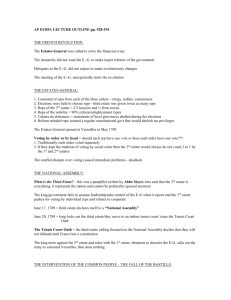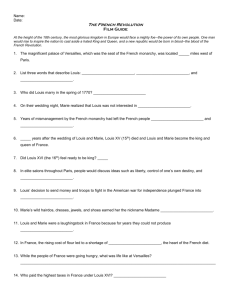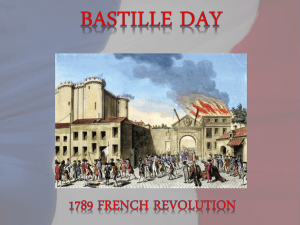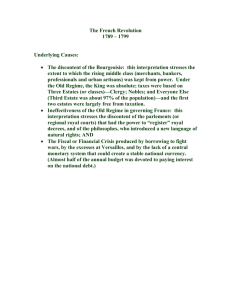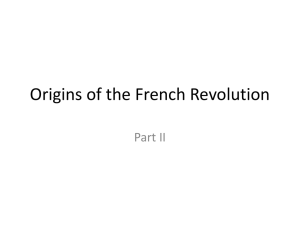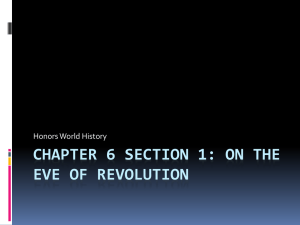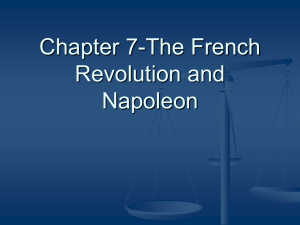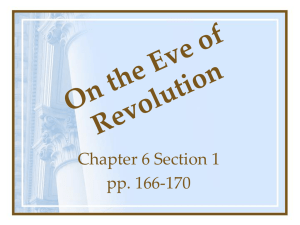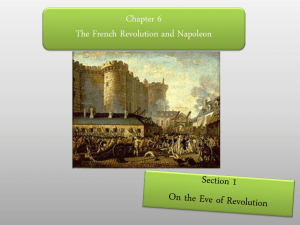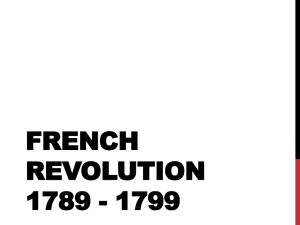Understanding the French Revolution
advertisement
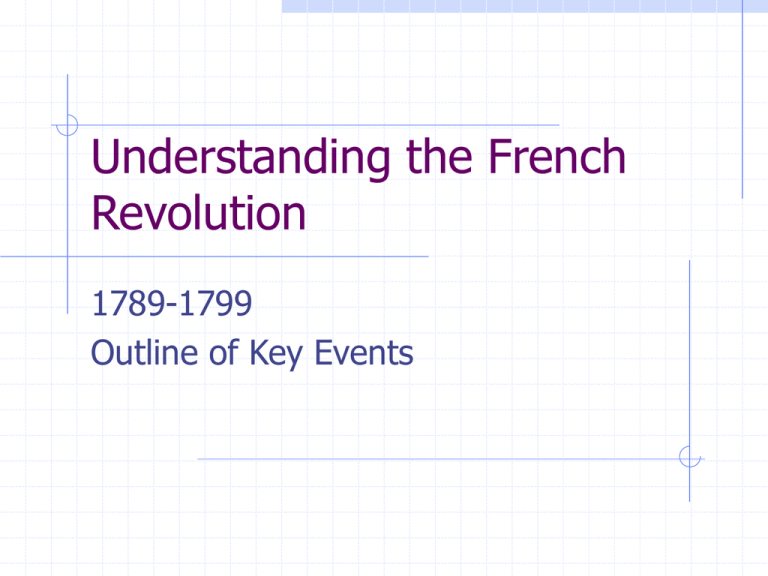
Understanding the French Revolution 1789-1799 Outline of Key Events Background and Causes By 1780s, France characterized by Absolutism of façade (I.e., in name only) Vast, confusing bureaucracy (think of the church roof which needed repair) One in which king interfered only at top levels but had little impact on the whole Indecisive monarch who was out of touch with the real state of the country Background and Causes Social and Legal system based on privilege, not equality or economic status First Estate: bishops and priests Second Estate: Nobles Third Estate: Everyone else Background and Causes Third Estate, especially wealthy bourgeoisie, resented privileges of nobility and clergy Peasants, 85% of population, resented privileges of wealthy landowners (to labor services, to require them to use ovens or presses) All in Third Estate resented tax burden, not shared by First and Second Estates The Fiscal Crisis: 1786-1788 1786, Calonne, royal treasurer, tells King Louis XVI that France is nearly bankrupt By 1788, France will not be able to pay even the interest on its national debt Why?: Years of overspending brought to a crisis by French aid to the American colonists during the American Revolution The Fiscal Crisis: Solutions 1787-88: Assembly of Notables Carefully selected by Calonne Includes bishops, nobles, wealthy bourgeoisie Task: reform tax structure Demands reforms in government Dismissed without solving problems The Fiscal Crisis: Solutions Obvious solution: Increase taxes & cut expenditures Problem: Debt service (interest) is biggest expense—cannot be cut without reneging on loans; other economies are implemented by king Problem: Tax burden fell mostly on poorest people; not possible to increase their taxes much more The Fiscal Crisis: Solutions 1788: Royal Decree reforming tax structure & taxing the privileged estates. Sent by King Louis XVI to Parlements (all dominated by nobles). Led by Parlement of Paris, Parlements, which register laws in France, refuse to register the edict on taxes; they want a share in governing France. Louis XVI, appearing in person, ordered Parlement of Paris to register the edict. King’s cousin, Duke d’Orleans, tells Louis that it is illegal for him to order the Parlement to register the Edict. Louis exclaims “It is legal because I wish it!” Parlement registers the edict in Louis’ presence but immediately rescinds their action when Louis leaves. Parlement suggests calling the EstatesGeneral to deal with fiscal situation. Estates-General: 1789 1788: Louis XVI summons an EstatesGeneral to meet in May 1789. Representatives elected from all three estates; nearly all adult men could vote. Third Estate elected bourgeoisie, mostly lawyers; First Estate elected many parish priests. Estates-General: 1789 Third Estate demands and is permitted to elect twice as many delegates as the other two (see document ‘What is the Third Estate?’). Meeting begins in May 1789 at Versailles. King and advisors fail to prepare an agenda for the meeting. Estates-General: 1789 Third Estate demands that delegates from all three estates meet and vote together in one body. When nothing happens, the Third declares itself the National Assembly, invites First & Second to join them. National Assembly, in June, swears to continue meeting until France has a constitution. Popular Uprisings: Paris In Paris: small merchants, shopkeepers, workers support National Assembly, fear food shortages and believe rumors that royal troops are coming to divert food from Paris and disperse Assembly July 14: Crowd looking for weapons destroys Bastille, kills guard and celebrates in streets of city (July 14 is the French national holiday) Popular Uprisings: Countryside ‘Great Fear’ of July-August: rumors spread that nobles are arming groups (‘brigands’) and preparing to enforce all old feudal dues as well as to impose new ones on peasants Peasant uprisings destroy manor houses, stealing contents, including wine stored in cellars, and burning records These spread all over France in a matter of weeks National Assembly Responds Decree of 4th August: Nobles and Clergy renounce all privileges; National Assembly approves enthusiastically Declaration of the Rights of Man and the Citizen (see document) delineates rights of Frenchmen to liberty, equality, freedom of speech and press, equal treatment before the law and the right to property. Assembly begins writing a constitution. Women’s March to Versailles October 1789: 7,000 women set out from Paris to tell the king that they needed bread to feel their families (see document). In Versailles, they invade National Assembly; send a group to talk to king; invade the royal palace, nearly killing the queen in her bedroom. King agrees to return to Paris with them; royal family under virtual house arrest. National Assembly also moves to Paris. Flight to Varennes (1791) June 1791, royal family flees Paris, headed for German border. King recognized when they stop to eat and change horses. Arrested at St. Mènehould and returned under guard to Paris. Family even more closely guarded in Paris after that. Constitution of 1791 September: Constitutional Monarchy (even though Louis XVI tried to flee previous June). Legislative Assembly makes laws; King retains veto power over legislation. Franchise (right to vote) limited to those who paid substantial taxes; right to hold office to those who paid even higher taxes (contrast with elections to Estates-General). The Second Revolution August 1792: Mob invaded Tuileries palace; royal family fled to National Assembly for protection & were arrested. Monarchy abolished; republic created/ Convention elected to write a new constitution. Sans-culottes of Paris (see document) influenced policies of Convention. France at war with rest of European monarchies, whose goal was to end the Revolution. Reign of Terror Committee of Public Safety charged with protecting revolution in France while French army protected nation from invaders. King charged with treason; executed in January 1793; Queen executed in October 1793. Terror: continued until July 1794, when Robespierre, head of the Committee of Public Safety, was himself executed as a traitor to the Republic. The Reaction (‘Thermidor’) Moderates dominated government; set up the Directory as the executive branch of government. Followed in several years by the Consulate, also a moderate government. In 1799: Napoleon seized power in a coup d’état; he would rule France until 1814. In 1814, the monarchy was restored with Louis XVIII (brother of Louis XVI) taking the throne.


